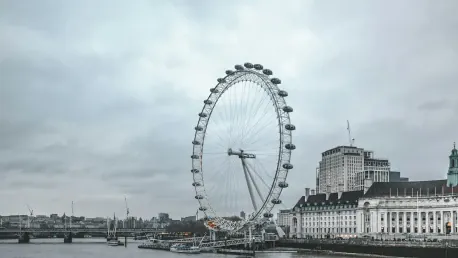After a prolonged period of turmoil induced by the COVID-19 pandemic, the UK’s hospitality sector is witnessing a significant resurgence. The number of licensed venues, including pubs, restaurants, bars, and hotels, has shown a notable upward trend for the first time in two years. This revival comes despite the economic uncertainties that have recently characterized the market, paving the way for a future brimming with potential and growth.
Post-Pandemic Recovery
The hospitality sector faced unprecedented challenges during the COVID-19 pandemic, which resulted in numerous business closures and financial difficulties. Many establishments fought to stay afloat, but the strain led to countless permanent shutdowns. However, recent months have brought a breath of fresh air, heralding the sector’s gradual recovery and offering a beacon of hope to beleaguered business owners and employees alike.
A study conducted by CGA by NielsenIQ and AlixPartners revealed that the total number of licensed hospitality venues in the UK recorded a net increase of 462 new openings between March and June. This development marks a crucial turning point, suggesting that businesses are beginning to find their footing again in the wake of the pandemic. The increase in venues across various sub-sectors, including pubs, restaurants, and bars, signifies a collective effort to rejuvenate the hospitality landscape, which was among the hardest-hit industries during the global health crisis.
Surge in Casual Dining
A standout metric in this revival is the growth within the casual dining sector. Casual dining restaurants have seen their first increase since early 2020, adding around three new sites per week over the last six months. This sector, which experienced a steep decline of about 24% over the three years following the onset of the pandemic, is now showing renewed signs of vitality and resurgence. The growth in casual dining not only highlights the sector’s recovery but also symbolizes a broader trend of increasing consumer confidence and willingness to dine out once again.
This upswing in casual dining is crucial because it underscores the broader recovery trends across the hospitality industry. Restaurants were among the hardest hit during the pandemic; therefore, witnessing an increase in their numbers points to rising consumer footfall and spending. Consequently, the casual dining sector’s resurgence is contributing positively to the overall growth of the UK hospitality industry, signaling an upward trend that offers hope for continued expansion and development.
Economic Backdrop and Market Stability
The overall growth of the hospitality sector can be partly attributed to an easing in economic pressures on households. As household budgets have seen slight relief, consumer spending in hospitality venues has picked up, creating a more favorable environment for business recovery. Industry firms are also reporting improved sales figures, which have provided a conducive atmosphere for growth and expansion. The easing of economic pressures is therefore vital in understanding the drivers behind the recent resurgence in the hospitality sector.
Despite these positive signs, it’s worth noting that the market remains sensitive. Although the number of new openings has been promising, the total count of outlets is still 1% lower compared to last year due to nearly 1,000 net closures. Nevertheless, the report highlights a stabilization of the market, offering a glimmer of hope for a more sustained and steady recovery in the coming months. The slight relief in household budgets and improved sales figures are critical components in driving this stabilization, signifying incremental progress toward a more secure future for the hospitality sector.
Fragility and Consumer Spending
Ongoing challenges remain a reality for many businesses within the hospitality sector. Cost pressures continue to be a significant concern, and discretionary consumer spending remains tight. These lingering issues underscore the fragility of the industry, even as it shows signs of recovery. While there are positive indicators, the precarious state of many establishments necessitates a measured approach to ensure the gains are sustainable. The balance between optimism and realism is essential to navigate these troubled waters effectively.
Consumer behavior plays a crucial role in the sector’s continued recovery. With discretionary spending under pressure, businesses must strategically manage their operations to maintain their upward trajectory. Understanding and adapting to consumer needs and trends will be key factors in cultivating long-term resilience. This delicate balance between growth and caution is vital for a robust and sustained recovery, as the sector navigates the complexities of a post-pandemic economy.
Industry Optimism
There is a sense of cautious optimism among industry representatives. Karl Chessell, Director at CGA by NielsenIQ, expressed that while it’s uncertain if the sector will return to its pre-COVID-19 size, the recent growth figures offer a promising outlook. His sentiment is echoed by Graeme Smith, Managing Director at AlixPartners, who views the return to growth as a stabilizing factor and a boost for future confidence in the sector. This cautious optimism is reflective of the industry’s careful yet hopeful approach to navigating the path toward full recovery.
The revival of the UK’s hospitality sector is encouraging, signaling opportunities for further growth and development. As the sector navigates its recovery, the focus remains on leveraging economic improvements and stabilizing the business environment to ensure a sustainable future. The combination of improved market stability, economic conditions, and rising consumer confidence forms a foundation on which the sector can build a resilient and thriving future.
Resurgence in Venue Numbers
After enduring an extended period of upheaval due to the COVID-19 pandemic, the UK’s hospitality sector is finally experiencing a substantial revitalization. For the first time in two years, there’s been a noticeable uptick in the number of licensed venues such as pubs, restaurants, bars, and hotels. This encouraging development is particularly remarkable given the recent economic uncertainties that have plagued the market. The pandemic brought an unprecedented challenge, leading to numerous closures and staff shortages while also forcing many establishments to rethink their operating models.
However, the sector’s resilience is now paying off. Many venues have re-opened with enhanced hygiene standards and innovative approaches to dining and service, such as outdoor seating and digital menus. The growing consumer confidence further supports this upward trend, as people are once more venturing out to socialize and enjoy meals outside their homes. This resurgence marks a hopeful turning point, offering a glimpse of a future filled with opportunity, growth, and renewed vibrancy for the UK’s hospitality industry.









